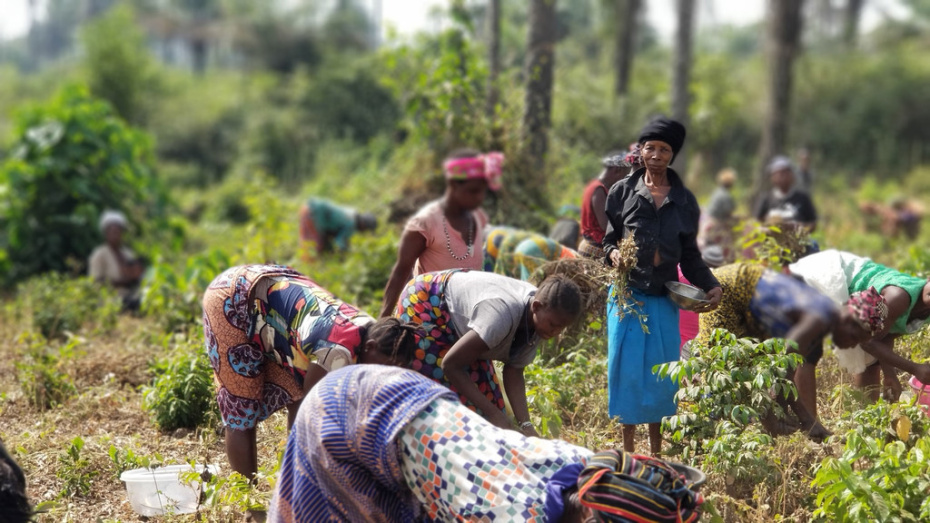Breadcrumb

‘We see the sparks before they turn into fires’: training women to avoid conflict in Sierra Leone

"We have learned how to see the sparks before they turn into fires, metaphorically speaking," says Susan Pessima, from Selenga Chiefdom, Bo District, in the south of Sierra Leone. "That’s important, because fires can spread fast if the conditions are right for it".
Ms. Pessima is talking about the fires of conflict and violence, fanned in part by the climate crisis, and dwindling natural resources. Often these take the form of land disputes. For example, there may be a disagreement over the boundary line between two properties. The problems often seem small, but they reflect larger and long-simmering tensions over class, ownership, and land rights. Sometimes, these disputes turn violent, and may even unleash bigger waves of violence.
‘Women see things other people don’t’
That’s why the government is training local people, including Ms. Pessima, to take on new leadership roles in peacebuilding, agriculture, entrepreneurship, and governance in their communities. So far, a total of 80 "community peace and conflict monitors" have been trained to work in their villages and towns to spot the signs of conflict before it leads to violence.
A big emphasis has been placed on training women, who make up three quarters of the peace and conflict monitors. "It’s no coincidence that these problems sprout and grow bigger even as women are discriminated against," says Nyabenyi Tito Tipo, Country Representative for the Food and Agriculture Organization (FAO) in Sierra Leone. "Any solution that leaves out half the population is bound to fail."
Women, says Ms. Pessima, are essential to building peace, and must be empowered. "We women know our communities well. We are in the homes, we are in the markets. We go out on the streets. We see things that other people don’t."

Taking charge
The project involves women not just in making peace but in making decisions. Women have been appointed to half of the positions in all of the 16 newly created "village area land committees" in the four participating districts, and two villages have their first-ever women Town Chiefs.
Another training session brought together Paramount Chiefs, local leaders, and "mammy queens" (important women leaders) in selected chiefdoms to help empower women in implementing the government’s National Land Policy.
One of the training participants was Desmond Kagobai, Paramount Chief of Selenga Chiefdom, Bo District. He says the message of the training was strong, and the practical guidance was useful. "If we want lasting peace and prosperity in our communities, then women must be involved from top to bottom and from start to finish."

Mutual support
The four-district program has also trained nearly 1,000 farmers—85% of them women—on finance and cooperatives. Women farmers have a harder time to secure resources than their male counterparts, as they are liable to be discriminated against in financial services—a big factor in poverty. Participants have formed Village Savings and Loan Associations (VLSA) for mutual support.
VLSA members can get small loans to cover expenses such as school fees and medical bills without selling farm equipment or other productive assets. That means they can contribute more to their household incomes. With support from UN-backed programmes, eight new farming cooperatives are now being registered with the government.
Another 2,500 people—80% of them women—have been trained in climate smart agriculture (CSA), with a focus on groundnuts, cassava, rice, and pepper and other leafy vegetables. Previously, most women farmers were practicing slash-and-burn agriculture; such practices may be more profitable in the short-term, but they damage the land and environment in the long-term. So, farmers have been taught good farming practices such as, mulching, soil and water conservation techniques, liquid and organic manure, among other conservation practices.
Imaging a better future for Sierra Leone
Training programme officials and participants say they feel more hopeful than ever before about the prospects for their villages and their country. "I learned a lot in the training, and I appreciate that," says Paramount Chief Desmond Kagobai. "Just as important is the fact that the government and the United Nations have affirmed the role of women in the country’s future."
One solution to the problems of Sierra Leone and the Sahel is simple but very difficult", says Ms. Tipo. "Women have got to be empowered and men have got to embrace women’s power. There’s nothing we can’t do if we do it together."
Sierra Leone’s peacebuilding programme
- The government training programme operates in four districts around the country. It is funded by the UN Secretary-General’s Peacebuilding Fund, and implemented by the Food and Agriculture Organization (FAO), and the International Labor Organization (ILO).
- 60 women and 20 men have been trained as community peace and conflict monitors, and a further 800 people have been trained on gender and land-rights issues.
- An educational campaign linked to the programme has produced jingles, radio programmes, pamphlets, and posters in multiple languages.
